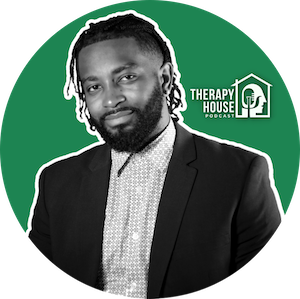 back to March 2024 newsletter
back to March 2024 newsletter
Interview with Jeremiah Knight, LMFT and host of the Therapy House podcast, and Vidur Malik, Director-at-Large, SCV-CAMFT
Vidur: Could you introduce yourself and the work that you do?
Jeremiah: I’m Jeremiah Knight. I’m a licensed marriage family therapist heading into my eighth year as a clinician. I graduated from Santa Clara University. I was born and raised in San Jose. I’m very happy to be back in the community. I currently run a private practice here in San Jose, working with parents on child custody and visitation within Santa Clara County. I’m also a podcast host, producer, promoter, man of many hats.
Vidur: In terms of the clinical work that you do, would you say that you have a particular specialization or area of focus?
Jeremiah: Right now in private practice, I mainly focus on anxiety, depression, and trauma within youth and adults. I’m very fascinated with hearing stories that come from their experiences of adversity and assisting them in finding meaning through it all.
Vidur: In addition to the clinical work that you do, I know you do a lot of multimedia work. Can you share just sort of what projects you currently have going on in the multimedia realm and what drew you to just doing that work?
Jeremiah: I produce the Therapy House podcast, which is a podcast that focuses on helping professionals as they breakdown their process and philosophy behind their work..
I had done a podcast before on Black mental health. I am really big on educating the population about therapy, especially in the Black community and trying to normalize it. I was able to learn how to develop a podcast, how to market it, all the pieces that went into it.
Therapy House came in with the same question of how other professionals did their work, what went into it, and what happened behind the scenes. I love the idea because we don't get to see other people do therapy. I wanted to create a space where people could share what went into their craft and be vulnerable enough to get the support they needed. A couple of friends of mine from grad school, Jon Tong, Jorge Meza, Luis Abbott, and Jeremy Ramos were open to the idea. I knew how to set up the podcast and be able to distribute it on all platforms.
A couple of them had some experience generating or working on a podcast. For the most part, we then began to create something that was unique in the podcast sphere.
We have an upcoming episode on therapist anxiety, describing the angst within our journey and craft. We've just completed an episode on eating disorders, an episode on the experience of queer and trans clinicians, and many more that I’m really excited to share with listeners. Content and stories that I, myself, have either been curious about or have been waiting to hear.
Vidur: There are therapy podcasts out there, but it sounds like the thing that makes Therapy House different is just that it takes you behind the scenes on the process from the clinician's perspective.
Jeremiah: Yeah, the therapist gets a therapist, and there's a mic in front of them. Helping is a growing process and the therapist changes just as much as the client on this journey. Here we illustrate it. If you have an idea or you've been mulling something over or you felt alone in it, you’ve got an opportunity to ask another clinician.
Vidur: What advice do you have for clinicians, even if they're not necessarily doing a multimedia project, on how to put their name out there and market what they do?
Jeremiah: Create things. Beyond it being a nice outlet, it adds marketability. Whether it is with a soundbite or video or a clip, or a blog or worksheet, all of that helps clients either find you or at least get what they need in some way. You just have to at least try to put out something. Try to get over the piece of creating that makes you feel uncomfortable. “Create for the joy of creating and sharing it with others” has been a mantra that I've been able to remind myself of on the days where I worked all week, and the last thing I want to do, on a Sunday, is sit in front of a camera.
Vidur: Is there a particular message or idea that you'd want somebody to walk away with after they listen to an episode of Therapy House?
Jeremiah: The initial message was that therapists are human too. There are things that go on behind the scenes. We have personal lives. It's not that we're these all-knowing beings that do everything immaculately. Being able to encourage clinicians and help them to be vulnerable, be open, and to ask “what comes up within you when life outside of therapy is chaotic?”
Vidur: Thank you so much for your time. Where can people find your podcast?
Jeremiah: People can find us on www.linktr.ee/therapy_house and Instagram at @therapyhousepodcast.
References:
Brown, T. E. (2014). Smart but Stuck: Emotions in Teens and Adults with ADHD. Jossey-Bass
Davis, P. (2021). Dedicated: The Case for Commitment in an Age of Infinite Browsing. Avide Reader Press
Siegel, D. and Bryson, P. (2021). The Power of Showing Up: How Parental Presence Shapes Who Our Kids Become and How Their Brains Get Wired. Ballentine Books Trade Paperback Edition
back to March 2024 newsletter
